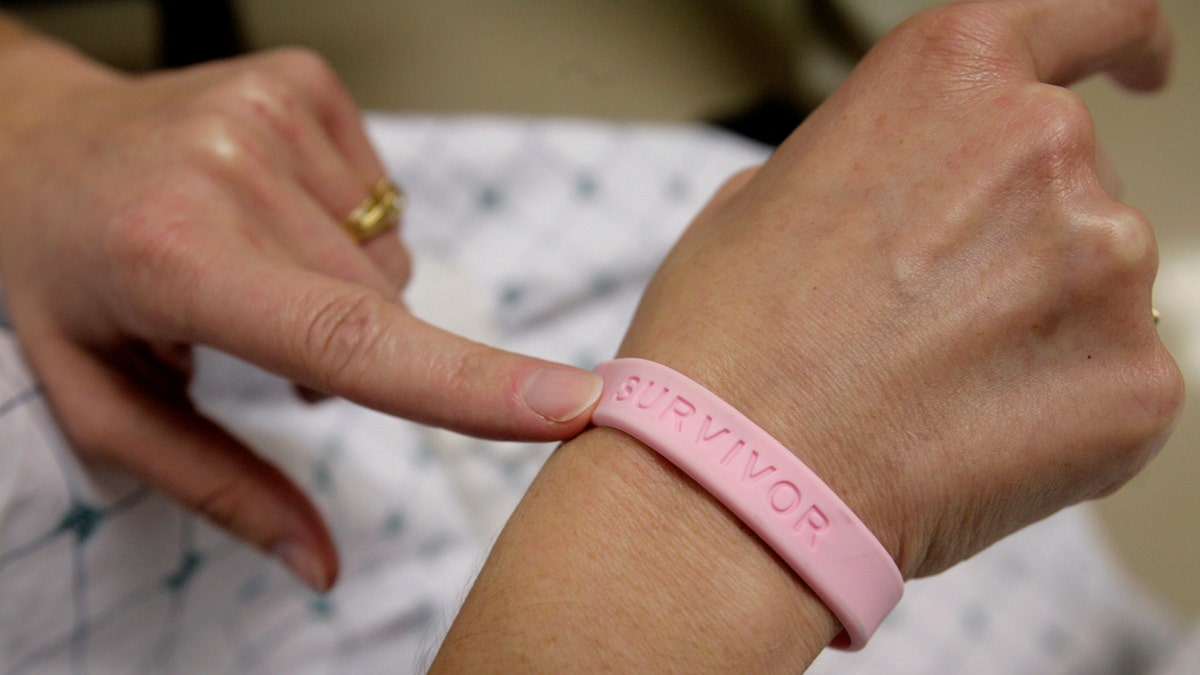
A cancer patient shows off her breast cancer survivor bracelet. (REUTERS/Jim Bourg)
A tailored six-week mindfulness program may lead to small improvements in some physical and psychological symptoms that breast cancer survivors often experience, according to a new study.
"Although not all patients suffer to a high degree from these distressing symptoms, research shows that due to treatment and long-term effects often patients experience depression, anxiety, sleep disturbances, fears of recurrence (FORs) and physical symptoms of pain and fatigue," said lead author Cecile A. Lengacher of the University of South Florida College of Nursing in Tampa.
When breast cancer survivors transition off of treatment and experience physical symptoms, they may worry that it's a sign of cancer recurrence and be at a higher risk for anxiety and depression, Lengacher told Reuters Health by email.
The researchers tested the effects of a Mindfulness Based Stress Reduction (MBSR) program and examined whether any particular types of patient seemed to benefit most from the therapy.
MBSR is a program developed decades ago at the University of Massachusetts to help seriously ill patients cope with pain, such as from advanced cancer or AIDS. But in recent years that program has been adapted and offered more widely to people seeking relief from pain and stress of many kinds.
For the new study, researchers compared 155 breast cancer survivors who completed a six-week MBSR program with 167 survivors who received usual care. Symptoms of depression, anxiety and stress, fear of cancer recurrence, fatigue, pain and quality of life were all measured before the study began, after the six-week program ended and another six weeks later.
Women in the mindfulness program attended two-hour sessions conducted by a clinical psychologist once weekly and received training manuals and CDs. They practiced four meditation techniques, including sitting, walking, body scan and Hatha yoga and learned how to apply them in daily life.
The researchers kept track of how many sessions each participant attended and how much of the assigned 15 to 45 minutes of at-home practice per day each completed, based on their diaries.
For the MBSR group, the largest mindfulness-related improvements happened during the first six weeks and most were maintained at 12 weeks. They experienced a greater reduction in anxiety, fear of recurrence and fatigue compared to those in the control group, although the improvements were small to moderate.
There was no meaningful difference for depression scores or pain levels, according to the results in the Journal of Clinical Oncology.
Mindfulness practice helps patients learn how to self-regulate their emotions by acceptance and non-reacting to internal and external cues and experiences, reducing reactions to emotional and physical triggers, and learning to be in the present, which diminishes the distress of worrying about the past or future, Lengacher said.
"Also, this trial showed that those patients with the most stress had the highest benefit from this trial, indicating the importance of screening patients for distress," Lengacher said.
Survivors of other types of cancer also suffer from varying symptoms depending on type and stage of cancer, she said.
MBSR classes, which tend to cost around $200, are widely available at hospitals and privately, as well as through online programs such as the one offered by the University of Massachusetts medical school (here: http://bit.ly/1vjU4kG).
A trained teacher delivers the mindfulness program so it would be hard for women to try it on their own, Lengacher noted.
